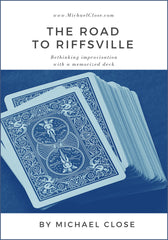
The Road to The Road to Riffsville
 I had not planned on writing The Road to Riffsville. I was spurred to action by the confluence of three events, which I’d like to share with you now.
I had not planned on writing The Road to Riffsville. I was spurred to action by the confluence of three events, which I’d like to share with you now.
Because I am an old father, when Ava came into my life I made the decision to limit my time away from home. This meant limiting my lecture, convention, and performing appearances. I wanted to be a stay-at-home dad. Fortunately, my work as a magazine editor allowed me to do that.
Because I wasn’t performing often, I had less contact with the routines I used to perform on a daily basis. This, as it turns out, is a good thing. When routines become second nature, it is too easy to overlook flaws in their construction. (This is the mental equivalent of blinking when you execute a sleight.) Consequently, when I now watch videos of my earlier performances, it is as if my blinders have been removed; all sorts of problems jump out at me. Previously, I had ignored them; now I needed to fix them.
In December of 2017 and January of 2018, I completed work on The Paradigm Shift Volumes One and Two. One chapter in Volume One, “Repose, Chaos, and Action,” came from my dissatisfaction with the way most magicians prepare for a classic force. I offered several solutions to this problem, and in doing so I clarified in my own mind the principles presented in the chapter. My purpose was to explain the ideas to my readers, but I was the greatest beneficiary of that process. The intelligent incorporation of the principles of repose, chaos, and action is one of most powerful tools available to conjurers.
Shortly after the publication of The Paradigm Shift ebooks, Lisa and I began work updating Closely Guarded Secrets. The memdeck routine, The Luckiest Cards in Las Vegas, caught my eye; I noticed procedures that, when examined under the guiding principles of repose, chaos, and action, were no longer optimal.
This led me back to my original writings on the memorized deck, which I published in Workers 5 in 1996. I discovered, to my dismay, that several ideas I put forth were incorrect, misleading, or sub-optimal. I needed to correct these errors.
I’m not going to beat myself up over this; our beliefs are based on the information we have at the time. There was a time when people believed the sun revolved around the earth – a belief supported by the visual information of the sun traveling through the sky once each day and the sensation that the earth did not move. With advancements in science and technology, this belief was upended. An important aspect of a scientific approach to the world is that you change your mind when presented with new information. (This is one way science differs from religion.)
I have information in 2018 that I did not have in 1990 when I began working with the memorized deck. This information consists of better techniques and clearly defined principles. Using this information, I reexamined my approach to memdeck magic and I attempted to fix the problems I saw. The Road to Riffsville contains what I discovered.
In particular, this ebook focuses on what I dubbed “Jazzin” in Workers 5. I coined this term because I stated that “improvisation” with a memdeck is like jazz improvisation. Unfortunately, this is incorrect. To equate the two things is a misleading and inaccurate analogy, and I fear it misled many readers. I have a better way of explaining it now.
The Road to Riffsville contains seven main chapters that address all aspects of one particular memdeck routine: several spectators each name a card and the magician reveals those cards in an amazing way. My demonstrations of this type of routine in the 1990s inspired many magicians to master a memorized deck.
The material in The Road to Riffsville is new, with an approach to the subject I have not seen before. It is not for the memdeck neophyte; however, if you have memorized a stack and you have some ability with estimation, you will find within its 28,000 words a substantial amount of valuable information.
As with our other ebook publications, we have combined text, photos, and video to provide unparalleled instruction.
The Road to Riffsville is coming your way very soon.
Heading
+29.000 people love our product

Comments
Leave a comment